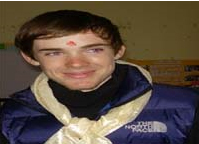
Harrison Odgers
I volunteered at PBCCS orphanage from 1st December 2010 to 27th December 2010. For the first week or so I focused on learning names and building trust between me and the kids. This was much easier than I thought – they are mostly quite outgoing and I felt they were comfortable with my presence almost immediately. For the next few days I tried to determine the English level of each individual child. Even though many are in the same grade at school (nursery) there is a range of different levels within this. For example Swostika has very very limited English, whereas Jamuna, who is in the same year level, can understand and communicate much more English. For the 3 girls in UKG grade at school, Kabita is the most advanced while Reena is the least. I determined the kids English level by using simple English books I brought from Australia that have pictures with their words underneath (eg Elephant, Pants, Flower, and also parts of the body – leg, arm, hand, toes, teeth ect…), by trying to ask simple questions to see if they understood (What is this? Is this yours? Ect…) and by looking at the children’s English books from school.
After determining the individual English levels of the kids I started to try and expand the Nursery level children’s basic vocabulary and for the UKG level kids I started to ask them advanced questions (where is the book? The book is under the bed ect…). After a while I realized that when I was working with a few children of the same level, the others would be either sitting around looking bored or trying to include themselves which disrupted what I was trying to teach. So I bought a whiteboard and some posters to put around the study room. Then some children could be practicing their multiplication and others their ABC’s while I was working with 2 or 3 at the whiteboard. This turned out to be pretty effective except that the markers run out quickly so the next person there will probably have to buy some more. I used this system for the second half of my stay. There is one older girl (13) who is attending school called Amrita. She goes to a different school to the other girls. She has very good English considering her age and background. To help her I decided it was best that I have conversations with her, so that she becomes more used to hearing English from a native speaker versus her Nepali English teacher. Also I gave her a maths book from the Australian equivalent of her school grade (8). We worked through the basic algebra and equations sections and she picked it up very quickly. I believe she is highly intelligent. It would be great if the next volunteer reviewed the things we learnt so she doesn’t forget.
In terms of hygiene, for the first few days I just observed what the children were doing. Most wash their hands before they ate. Brushing of teeth seemed to be random, maybe depending on if their guardian remembered. After the first week I then tried to get them to brush their teeth everyday and wash their hands with soap before eating. They do wash their hands now before eating but brushing teeth is still only around 3 out of 4 days, which I think is due to lack of toothpaste. The children wore around 2 sets of clothes during my stay (one for the first 2 weeks, one for the second) and their uniform when they go to school. The clothes became quite dirty and some of them seemed to have skin rashes that they couldn’t stop scratching. Some of the children – Swostika, Meena, Anmuna – seem very skinny and maybe malnourished.
Aside from all the difficulties they face the kids are still just regular kids that love to dance, play football, draw pictures and sing. They each have interesting personalities and deserve as much love and attention as they can get
